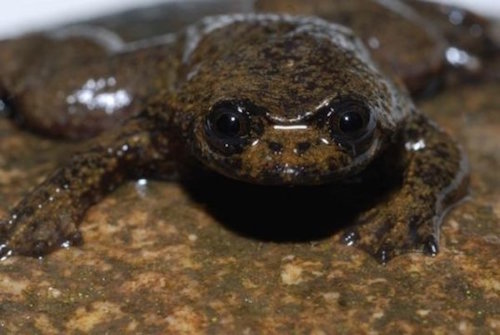 Evolution
Evolution
Biologist “Flabbergasted” by Lungless Frog

Why do biologists travel the world over? They go to the bottom of the ocean and to the tops of mountains, to deserts and jungles. The reason is they are rewarded for their efforts. The one rule in biology is there are no rules. Everything is different, and everywhere is different.
When John Ray toured Europe for three years, from 1663 to 1666, studying the flora and fauna, he found the organisms and their interactions were different everywhere he went. Biology is full of diversity, and it makes no sense in the light of evolution.
Consider Barbourula kalimantanensis, the frog that has no lungs. These small, elusive, lungless amphibians live in cold, fast rivers, deep in the rainforests of Borneo. Ten years ago David Bickford and his patient international team of biologists worked hard and long to find some specimens for their study.
Bickford and his colleagues had an idea of what they were looking for, but they had no idea, and no reason to suspect, that the two-inch frog would be lungless. As Bickford recounted:
At first I did not believe that the frogs had no lungs, but then, we just kept on seeing the evidence pile up. I was flabbergasted.
It was all a lesson, once again, in biology’s only rule, and that exploration seems to always pay off:
The thing that struck me most then and now is that there are still major firsts — for example, first lungless frog! — to be found out in the field. All you have to do is go a little ways beyond what people have done before, and — voila! … There are so many difficulties in field work, and yet it remains my biggest joy. Having the undeniable privilege of going out to these remote sites, seeing some of the last and greatest treasures that exist in the wild, and then getting to study them — well, every day I feel lucky.
It turns out that some species can forego their lungs altogether in their embryonic development, given the right environmental conditions. This is another example of rapid, directed adaptation, in response to the environment.
If such a sophisticated development plasticity could have evolved — “and oh! what a big if!” — it would provide no immediate fitness improvement, and so would not be selected for. It would be subject to harmful mutations, and be long forgotten in the annals of evolutionary history.
This is intelligent adaptation, which, to repeat, makes no sense in the light of evolution.
Cross-posted at Darwin’s God.
Photo credit: David Bickford via Science Daily.
